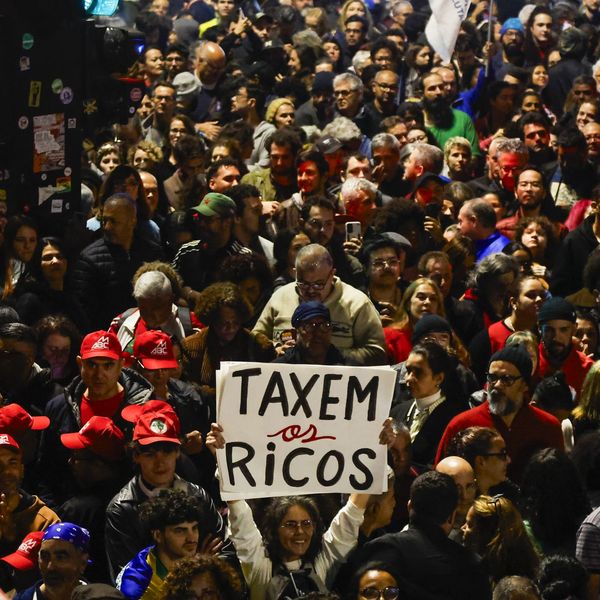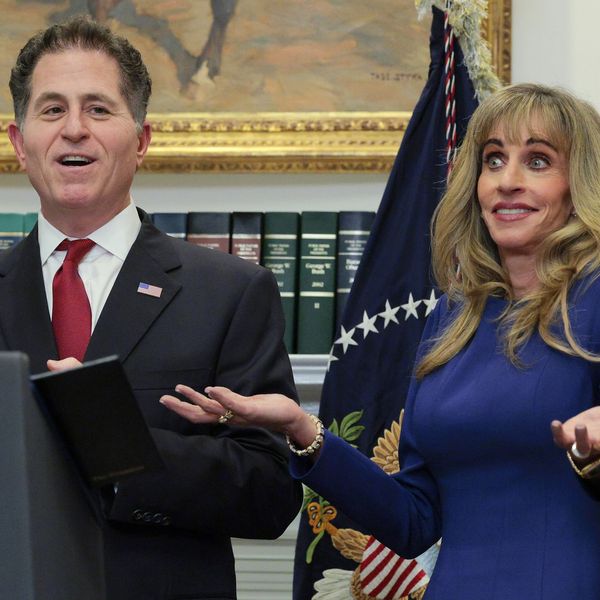New Extreme in Inequality Crisis as 62 People Own as Much as Poorest Half
Oxfam report finds that global one percent of wealth holders now own more than the rest of the world combined
It's official. The global one percent of wealth holders now own more than the rest of the world combined, a new report released Monday confirmed.
"The global inequality crisis is reaching new extremes," stated Oxfam International's An Economy for the 1% (pdf), which found that the gap between the richest and poorest has widened so dramatically in the past 12 months that the world's 62 wealthiest individuals now own as much as the poorest half of the global population, roughly 3.6 billion people.
In fact, the wealth of the poorest half has fallen by a trillion dollars since 2010 while the wealth of the richest 62 people has risen by 44 percent to total $1.76 trillion.
"It is simply unacceptable that the poorest half of the world's population owns no more than a few dozen super-rich people who could fit onto one bus," said Winnie Byanyima, executive director of Oxfam International.
The report comes just days before the opening of the World Economic Forum's annual meeting, which will be held January 20-23 in Davos, Switzerland. At the conference, Oxfam is expected to reiterate their call for urgent action on the inequality crisis. Specifically, the group is calling for an end to the era of offshore tax havens.
"Far from trickling down, income and wealth are instead being sucked upwards at an alarming rate," the report states. "Once there, an ever more elaborate system of tax havens and an industry of wealth managers ensure that it stays there, far from the reach of ordinary citizens and their governments. One recent estimate 4 is that $7.6 trillion of individual wealth--more than the combined gross domestic product (GDP) of the UK and Germany--is currently held offshore."
This system, Oxfam says, enables rich individuals and companies to avoid paying their fair share to society, denying governments the necessary resources to tackle poverty and inequality.
For example, the report found that almost a third of all African financial wealth--totally $500 billion--is estimated to be held offshore, depriving governments of roughly $14 billion in lost tax revenues every year.
"This is enough money to pay for healthcare that could save the lives of 4 million children and employ enough teachers to get every African child into school," the report states.
The report further notes that women are disproportionately impacted by this growing wealth gap.
"Women make up the majority of the world's low-paid workers and are concentrated in the most precarious jobs," the report states. And compounding global inequality is the fact that such low wage workers in almost all developed and most developing companies are receiving a falling share of national income, while profits are increasingly concentrated in the hands of those at the top.
"CEOs at the top U.S. firms have seen their salaries increase by more than half (by 54.3 %) since 2009, while ordinary wages have barely moved," it notes.
"The world has become a much more unequal place and the trend is accelerating," said Byanyima. "We cannot continue to allow hundreds of millions of people to go hungry while resources that could be used to help them are sucked up by those at the top."
She added: "The richest can no longer pretend their wealth benefits everyone - their extreme wealth in fact shows an ailing global economy. The recent explosion in the wealth of the super-rich has come at the expense of the majority and particularly the poorest people."
An Urgent Message From Our Co-Founder
Dear Common Dreams reader, The U.S. is on a fast track to authoritarianism like nothing I've ever seen. Meanwhile, corporate news outlets are utterly capitulating to Trump, twisting their coverage to avoid drawing his ire while lining up to stuff cash in his pockets. That's why I believe that Common Dreams is doing the best and most consequential reporting that we've ever done. Our small but mighty team is a progressive reporting powerhouse, covering the news every day that the corporate media never will. Our mission has always been simple: To inform. To inspire. And to ignite change for the common good. Now here's the key piece that I want all our readers to understand: None of this would be possible without your financial support. That's not just some fundraising cliche. It's the absolute and literal truth. We don't accept corporate advertising and never will. We don't have a paywall because we don't think people should be blocked from critical news based on their ability to pay. Everything we do is funded by the donations of readers like you. Will you donate now to help power the nonprofit, independent reporting of Common Dreams? Thank you for being a vital member of our community. Together, we can keep independent journalism alive when it’s needed most. - Craig Brown, Co-founder |
It's official. The global one percent of wealth holders now own more than the rest of the world combined, a new report released Monday confirmed.
"The global inequality crisis is reaching new extremes," stated Oxfam International's An Economy for the 1% (pdf), which found that the gap between the richest and poorest has widened so dramatically in the past 12 months that the world's 62 wealthiest individuals now own as much as the poorest half of the global population, roughly 3.6 billion people.
In fact, the wealth of the poorest half has fallen by a trillion dollars since 2010 while the wealth of the richest 62 people has risen by 44 percent to total $1.76 trillion.
"It is simply unacceptable that the poorest half of the world's population owns no more than a few dozen super-rich people who could fit onto one bus," said Winnie Byanyima, executive director of Oxfam International.
The report comes just days before the opening of the World Economic Forum's annual meeting, which will be held January 20-23 in Davos, Switzerland. At the conference, Oxfam is expected to reiterate their call for urgent action on the inequality crisis. Specifically, the group is calling for an end to the era of offshore tax havens.
"Far from trickling down, income and wealth are instead being sucked upwards at an alarming rate," the report states. "Once there, an ever more elaborate system of tax havens and an industry of wealth managers ensure that it stays there, far from the reach of ordinary citizens and their governments. One recent estimate 4 is that $7.6 trillion of individual wealth--more than the combined gross domestic product (GDP) of the UK and Germany--is currently held offshore."
This system, Oxfam says, enables rich individuals and companies to avoid paying their fair share to society, denying governments the necessary resources to tackle poverty and inequality.
For example, the report found that almost a third of all African financial wealth--totally $500 billion--is estimated to be held offshore, depriving governments of roughly $14 billion in lost tax revenues every year.
"This is enough money to pay for healthcare that could save the lives of 4 million children and employ enough teachers to get every African child into school," the report states.
The report further notes that women are disproportionately impacted by this growing wealth gap.
"Women make up the majority of the world's low-paid workers and are concentrated in the most precarious jobs," the report states. And compounding global inequality is the fact that such low wage workers in almost all developed and most developing companies are receiving a falling share of national income, while profits are increasingly concentrated in the hands of those at the top.
"CEOs at the top U.S. firms have seen their salaries increase by more than half (by 54.3 %) since 2009, while ordinary wages have barely moved," it notes.
"The world has become a much more unequal place and the trend is accelerating," said Byanyima. "We cannot continue to allow hundreds of millions of people to go hungry while resources that could be used to help them are sucked up by those at the top."
She added: "The richest can no longer pretend their wealth benefits everyone - their extreme wealth in fact shows an ailing global economy. The recent explosion in the wealth of the super-rich has come at the expense of the majority and particularly the poorest people."
It's official. The global one percent of wealth holders now own more than the rest of the world combined, a new report released Monday confirmed.
"The global inequality crisis is reaching new extremes," stated Oxfam International's An Economy for the 1% (pdf), which found that the gap between the richest and poorest has widened so dramatically in the past 12 months that the world's 62 wealthiest individuals now own as much as the poorest half of the global population, roughly 3.6 billion people.
In fact, the wealth of the poorest half has fallen by a trillion dollars since 2010 while the wealth of the richest 62 people has risen by 44 percent to total $1.76 trillion.
"It is simply unacceptable that the poorest half of the world's population owns no more than a few dozen super-rich people who could fit onto one bus," said Winnie Byanyima, executive director of Oxfam International.
The report comes just days before the opening of the World Economic Forum's annual meeting, which will be held January 20-23 in Davos, Switzerland. At the conference, Oxfam is expected to reiterate their call for urgent action on the inequality crisis. Specifically, the group is calling for an end to the era of offshore tax havens.
"Far from trickling down, income and wealth are instead being sucked upwards at an alarming rate," the report states. "Once there, an ever more elaborate system of tax havens and an industry of wealth managers ensure that it stays there, far from the reach of ordinary citizens and their governments. One recent estimate 4 is that $7.6 trillion of individual wealth--more than the combined gross domestic product (GDP) of the UK and Germany--is currently held offshore."
This system, Oxfam says, enables rich individuals and companies to avoid paying their fair share to society, denying governments the necessary resources to tackle poverty and inequality.
For example, the report found that almost a third of all African financial wealth--totally $500 billion--is estimated to be held offshore, depriving governments of roughly $14 billion in lost tax revenues every year.
"This is enough money to pay for healthcare that could save the lives of 4 million children and employ enough teachers to get every African child into school," the report states.
The report further notes that women are disproportionately impacted by this growing wealth gap.
"Women make up the majority of the world's low-paid workers and are concentrated in the most precarious jobs," the report states. And compounding global inequality is the fact that such low wage workers in almost all developed and most developing companies are receiving a falling share of national income, while profits are increasingly concentrated in the hands of those at the top.
"CEOs at the top U.S. firms have seen their salaries increase by more than half (by 54.3 %) since 2009, while ordinary wages have barely moved," it notes.
"The world has become a much more unequal place and the trend is accelerating," said Byanyima. "We cannot continue to allow hundreds of millions of people to go hungry while resources that could be used to help them are sucked up by those at the top."
She added: "The richest can no longer pretend their wealth benefits everyone - their extreme wealth in fact shows an ailing global economy. The recent explosion in the wealth of the super-rich has come at the expense of the majority and particularly the poorest people."

